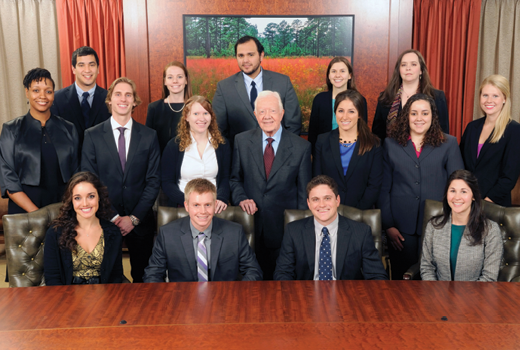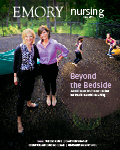Carter's upbringing shaped his view of nursing and health
 Board members of the Emory Student Nurses Association posed with former President Jimmy Carter before his lecture to students in the schools of nursing, medicine, and public health.
Board members of the Emory Student Nurses Association posed with former President Jimmy Carter before his lecture to students in the schools of nursing, medicine, and public health.
Lillian Carter made a lasting impression on her famous son when he was a child—even when she wasn't around.
Her absence from home meant that she was out in the community providing nursing care, primarily to poor African American families.
"We didn't see her for weeks at a time," recalled Nobel laureate and former U.S. President Jimmy Carter during a lecture sponsored by the Emory Student Nurses Association (ESNA). "My mother devoted her life to caring for people in need."
Carter and his three siblings grew up in Archery, Georgia, just west of the town of Plains, where his mother practiced nursing at Wise Sanitarium, his birthplace. "I was the first president born in a hospital," Carter told his audience of more than 400 nursing, public health, and medical students this past spring.
Since joining Emory as University Distinguished Professor in 1982, Carter and his wife, Rosalynn, have led the efforts of the Carter Center to advance health and peace worldwide. In the years since, the center has strived to eliminate Guinea worm disease in Africa and Asia and make it the second disease to be eradicated after smallpox. They also have worked to observe elections and resolve conflicts in other countries, pioneer public health approaches to prevent or control neglected tropical diseases, and improve mental health care and reduce stigma.
"You can tell where my heart is because of my mother and background," Carter said of his life's work.
At the School of Nursing, the Lillian Carter Center for Global Health & Social Responsibility addresses health and social issues in the spirit of Miss Lillian who, in her late 60s, cared for the poorest of the poor as a Peace Corps volunteer in India.
In her son's view, the growing chasm between rich and poor is the biggest challenge of the millennium.
"There's no way to separate political freedom and democracy from the basic rights of food, health, security, and human dignity," Carter said.
"Nurses and public health professionals are the ones who see the adverse effects of the absence of health care. They are the ones who have the strongest voices," he told students. "Speak up every way you can. It's your responsibility as a health care professional."—Pam Auchmutey


